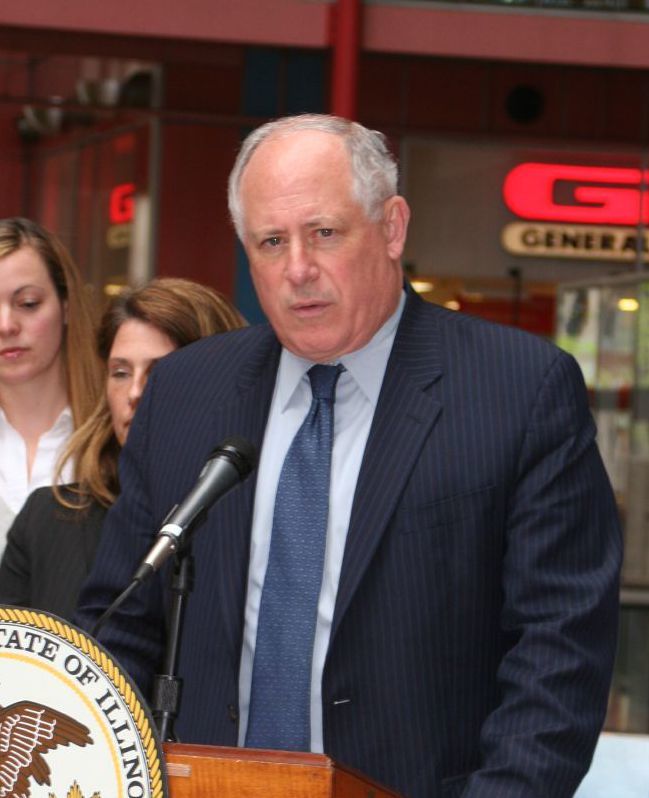Illinois, perhaps the most financially challenged state in the Union, is either inching back to health or accelerating its plunge into insolvency—depending on who’s doing the talking.
Gov. Pat Quinn, a Democrat who faces reelection this fall, pronounced in his Jan. 28 State of the State address, “Illinois is making a comeback” after suffering through the “perfect storm” of a “triple crisis of government corruption, economic collapse, and financial instability.”
Of the last three Illinois governors, Quinn is the only one who hasn’t ended up in a federal prison cell. He can claim progress on that front, but he also provoked critics from both major political parties by asserting he had “accomplished comprehensive pension reform.” He quoted Moody’s Investors Service as saying Illinois had possibly the “largest reform package implemented” by any state.
His office also points to a study by CareerBuilder and Economic Modeling Specialists International which shows Illinois ranked third-highest nationally in the creation of net new business establishments, totaling 18,000 from 2009 to 2012. Quinn does not mention the state lost almost 34,000 payroll jobs in that time and has the nation’s third-worst unemployment rate.
Quinn’s critics—of whom there are many in both major political parties—beg to differ.
Dubious Pension Reform Benefits
They note the pension reform mostly affects new government workers and leaves overly generous benefits in place for existing employees and retirees. And even the minimal gains might never be realized because public employee unions have filed suit, alleging the reforms violate a state constitutional provision against diminishment of negotiated benefits.
Even with the reforms, Illinois’ pension debt burden remains the highest among the states and puts the state’s solvency at risk. And the back-loaded reforms will do little, if anything, to bring the state up to date on a backlog of more than $6 billion of unpaid bills.
Also, three years ago, straining under the pressure of huge budget deficits, unpaid bills and growing unfunded pension liability, the governor and legislature raised the state’s personal income tax rate by 67 percent, to 5 percent from 3 percent. They also raised the corporate income tax rate by 46 percent, to 7 percent from 4.8 percent. Combined with an existing 2.5 percent “personal property replacement tax,” corporations in the state now pay an effective income tax of 9.5 percent.
As part of the deal, the increases are to sunset on Jan. 1, 2015—the 5 percent individual rate would drop to 3.75 percent and the corporate rate to 5.25 percent. The individual rate would go to 3.25 percent on Jan. 1, 2025.
Complicated Tax Issues
But many doubt the rollbacks will happen. Already there are calls from some legislators and others to make the “temporary” increases permanent. Quinn has dodged the question and isn’t expected to make his position clear until he delivers his budget message for the fiscal year beginning on July 1. When that will be is, as of this writing, is unclear.
The question has been complicated by a startling proposal sprung by fellow Democrat and House Majority Leader Michael Madigan, who engineered the tax increases: Cut corporate taxes in half.
His legislation (HB 4479) would reduce the 7 percent corporate rate to 3.5 percent (but retain the 2.5 percent replacement tax, making for an effective corporate rate of 6 percent). The reduction in the individual rate would remain as scheduled.
However, the corporate tax cut would not apply to the 75 percent of Illinois businesses that file as individual taxpayers—the businesses that account for most job creation.
The tax situation is further complicated by legislation that has been introduced to convert the state’s flat income tax into a graduated tax to charge higher rates on higher incomes.
Businesses vs. Individuals?
Government and tax watchdogs have been cautious in their analyses, especially of the unexpected Madigan proposal. Benjamin VanMetre, senior budget and tax policy analyst at the Illinois Policy Institute, a free-market think tank, suggested Madigan is angling to make the graduated tax more palatable to the business community.
Others suggest the proposal might be a tradeoff for an increase in the state’s minimum wage, now at $8.25. Others speculate Madigan is trying to divert attention from the state’s dismal jobs and economic development climate, which Republicans are increasingly using as an election issue against the Speaker’s Democratic legislative allies.
As appealing as a tax cut might be to the business community, VanMetre and Laurence Msall, president of the nonpartisan Civic Federation, say much more is needed to right the state’s fiscal ship. Further pension system reforms are among the necessary additions, they say.
Madigan’s tax cut would leave the state with a $1.5 billion annual hole and the $6 billion in unpaid bills. This could be where a graduated income tax would come into play, making the “rich pay a fuller share” as part of a package of tax reforms.
For now, Madigan argues the corporate tax cut would generate the additional extra revenue to fill the hole, making Illinois’ most powerful Democratic Party lawmaker sound more Republican than some Republicans. With four men contending for the Republican Party’s nomination to run for governor, the political implications are somewhat cloudy. And that means more increasing fog for the state’s financial condition.
Dennis Byrne ([email protected]) is a Chicago freelance writer and a Chicago Tribune contributing op-ed columnist.




